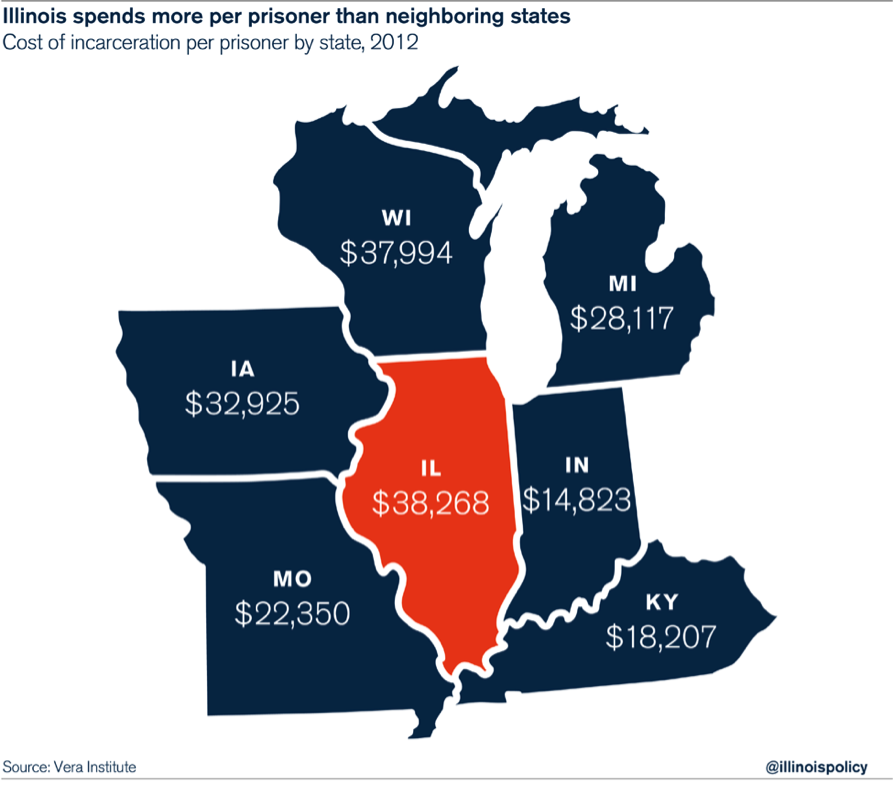Rauner reaffirms commitment to criminal-justice reform
Gov. Bruce Rauner highlights the continued need for criminal-justice reform to save taxpayer dollars and restore opportunity. To get there, Illinois must embrace reforms that enable ex-offenders to provide for themselves and their families once they’ve served their sentences.
In February 2015, Gov. Bruce Rauner formed the Illinois State Commission on Criminal Justice and Sentencing Reform, tasking the group with developing policies to safely reduce Illinois’ prison population by 25 percent by 2025. With the commission nearly a year into its work, Rauner reaffirmed his commitment to reaching this goal at the commission’s Jan. 14 meeting, where the governor discussed how Illinois’ criminal-justice system, like the rest of the state, has “been living from crisis to crisis and unbalanced budgets to unbalanced budgets for decades.” Rauner added, “[W]e have to change that.”
The governor is right that criminal justice, like many other parts of Illinois’ government, is breaking the bank. In 2015, the state spent over $1.4 billion on the Illinois Department of Corrections, or IDOC, up $110 million since 2010 to say nothing of the costs of courts, law enforcement and jails at the local level. In fact, Illinois is spending more in prison-related costs than any of its neighbors.
The good news is that prison populations have declined over the last two years. As of Jan. 5, IDOC held 45,938 inmates, according to IDOC’s public information officer – a decrease from a peak of 49,321 inmates held in January 2013. This is a good sign, but Illinois prisons are still overcrowded and stand out nationally in this regard. Illinois holds nearly 46,000 inmates in state facilities that were approved to hold just 32,095 persons, putting Illinois prison facilities at 143 percent capacity.
To put this in perspective, if Illinois had these lower numbers in 2014, it would still have led the nation in prison overcrowding. The state has a long way to go to improve this dangerous overcrowding, which threatens the safety of inmates and prison workers.
But to reap the benefits of lower corrections costs, Illinois needs to build on policy reforms and continue improving its criminal-justice system. Cutting back on mandatory minimum sentencing and focusing on treatment instead of incarceration for drug offenders can save resources.
Rauner’s commission should also focus on positioning offenders to succeed once they’ve served their sentences, creating an environment in which ex-offenders can successfully re-enter society. Over 45 percent of Illinois’ prison population returns after 3 years – which costs taxpayers more than $40,000 per offender in court, arrest and prison costs, according to research by the Illinois Sentencing Policy Advisory Council.
Research has demonstrated that participation in educational and vocational programs while in prison is associated with lower recidivism rates once inmates are released. One study by the nonpartisan Rand Corp. showed that every dollar invested in prison education programs reduced spending on post-release incarceration by $4 to $5. But rehabilitating ex-offenders and providing educational opportunities while they serve their time won’t benefit ex-offenders and society nearly as much if Illinois doesn’t address the state laws that make it difficult – if not impossible – for rehabilitated ex-offenders to find work. Not only does re-entry reform provide ex-offenders a second chance through meaningful employment, it also helps the state lower spending on prisons, as fewer people who find stable employment return to prison.
Securing fair and effective sentences for those convicted of crimes and removing barriers to work and employment for rehabilitated former offenders deserve broad support. By pushing forward with reform, Illinois can save money, promote public safety, and ensure a smarter and fairer justice system for all.

